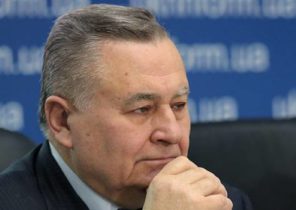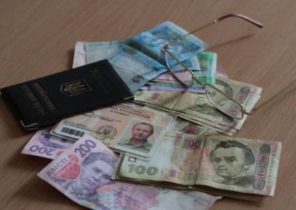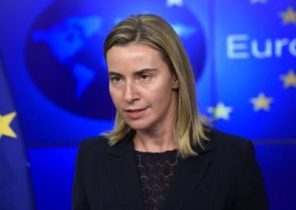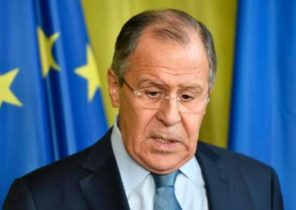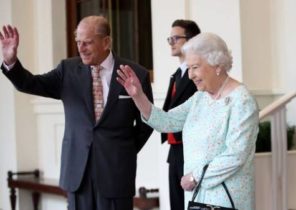Political talk-shows on Georgian television: every Monday 44-year-old star journalist Irakli Absandze passed by politicians and economic bosses, functionaries. But now all in the past because of the coronavirus. Irakli Absandze for several weeks sitting at home in Tbilisi. It is in reserve in case someone from the colleagues from television news sick, then he will come on as a substitute. “I now do all my shopping online. Toilet paper good purchase. Rice, flour, corn flour and so on. All that is usually needed”.
Georgia has already closed its borders, including because of the proximity to covered coronavirus Iran. Night curfew, restaurants and many shops are closed. In mid-April, was denied even movement by private car.
Georgia: the incredibly high trust in government
Kristina Gerasimova, expert on Eastern Europe of the German society for foreign policy (DGAP), has been studying the impact of the pandemic coronavirus in European neighbourhood countries, including Georgia.
“There’s the first case of coronavirus was recorded at the end of February. It was a man who returned from Iran. The Georgian government knows that the health system is relatively poorly funded. So previously imposed restrictions. So at least believe in the West and in the region.”
The confidence of Georgians to their government greatly. This is unusual, because the country split into two political camps, which already many years are waging a fierce struggle. But because of the pandemic, conflicts fade into the background. The government is consulting with physicians and implementing their recommendations.
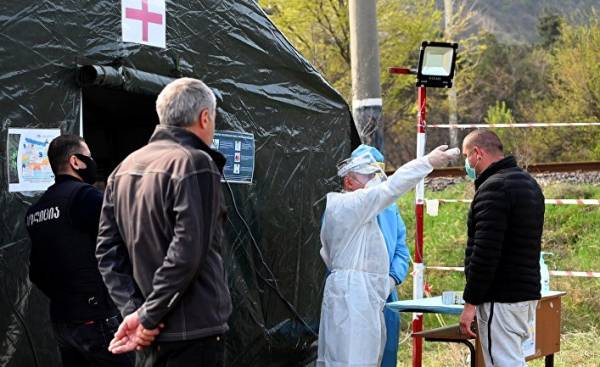 © Sputnik | go to fotobabble at the entrance to Tbilisi
© Sputnik | go to fotobabble at the entrance to Tbilisi
In Georgia, according to the Johns Hopkins University, only 600 infected and few deaths. The numbers from Georgia is reliable, the analyst said Gerasimov, in contrast to many other countries in Eastern Europe.
“The region has a problem with the reliability of the data. It varies from country to country — depending on how many tests are carried out and how transparent cost of power with numbers”.
In many countries of Eastern Europe the political leadership is trying to use the pandemic for their own purposes, instead of listening to the advice of doctors, said Gerasimov.
“Where the medical staff has assumed responsibility, the results are better. Where the political leadership reserves the right of interpretation, success less. In such countries, in addition, a small trust in political institutions. As a result, residents of these countries do not always take seriously the recommendations of public health institutions”.
Lukashenko in Belarus: vodka and a vs virus
The most striking example — Belarus. There the dictator Alexander Lukashenko advised to fight infection with the help of vodka and saunas. Officially the number of infections, according to Johns Hopkins University in the country at around 19 thousand.
“It is the only country in the region, which has a very weak approach. President Lukashenko has not established any national or international travel restrictions, no quarantine. Sports competitions are held. Cafes etc it is Interesting that in Belarus, this caused strong reactions from civil society and the private sector. Operates a kind of social isolation”.
Ukraine, by contrast, was quickly introduced restrictive measures to soften the impact of the pandemic. Like many Ukrainians, Beloborodova Irina lives in a small apartment in the panel house on the outskirts of the city. But now she’s watching the cat of a friend in a more spacious apartment in the center. Call in Kiev: “I am in the apartment of a friend who was unable to return to Bali”.
In Kiev, usually bustling metropolis with three million inhabitants, it was quiet. Metro does not work. Only employees of strategic enterprises receive a pass entitling them to use public transport. Movement on cars is prohibited.
Beloborodova works in the Ukrainian Fund. “I’m lucky that I can walk to work. Twenty minutes.”
Beloborodova Irina talks about a friend who went to be tested for the coronavirus in a hospital. “She had to stay there for three days while watching her. Then it was the weekend. And couldn’t do her test. No matter for what reason. Then I brought her more food.”
In the end, the test result was negative.
Age staff of Eastern health system
In many countries praemico USSR coronavirus has fallen on an unprepared health care system, says Kristina Gerasimova. Although in Eastern Europe since Soviet times a relatively long beds, but… “with regard to these countries, their health systems are unable to cope with the scale of the pandemic. They are chronically underfunded, and in some places of high corruption.”
The human consequences fatal. And it’s not necessarily related to personnel. Doctors and nurses do what they can, but they do very poorly protected. In addition, the nurses are often very age, because young people have long been abroad where they pay more.
In recent weeks, Russia became the center of a pandemic of mers. Long argued that cases there is very little, but the Agency recorded an abrupt increase in cases of pneumonia.
Olga Korobtsova — retired. She and her husband live in the center of Moscow, but now in advance went to the cottage. Olga is worried primarily for his mother. She lives in Moscow with her sister, and she, like all older people in Russia, not being allowed to leave the house. “That’s opposed to our friends abroad: they trust their government, we’re not.”
To implement these measures, the authorities in Russia use the facilities, which in Germany is forbidden. For example, a face recognition system. Even before the pandemic has installed numerous surveillance cameras. And now people are allowed to go out only in the presence of a QR code. This code is requested online and delivered to the mobile phone.
Russia: fear control
The opposition warned that the control system, which is now becoming more extensive to verify compliance with measures against the coronavirus, which later can be used to spy on critics of the regime.
In addition, the pandemic is still ongoing. She has yet to reach the peak, according to the mayor of Moscow Sergey Sobyanin. It comes from the fact that at least 2% of Moscow’s population are infected with coronavirus. If you take the official data on nearly 12.5 million people in the capital who are infected will be about 250 thousand. But, according to official statistics, in the whole of Russia by this moment, only 135 thousand cases of the coronavirus (as of may 14, 252 245 thousand — approx. ed.). There are suspicions that the official figures are deliberately understated. Help in this media, which is read by almost all in Russia, but which in reality are few who believe.
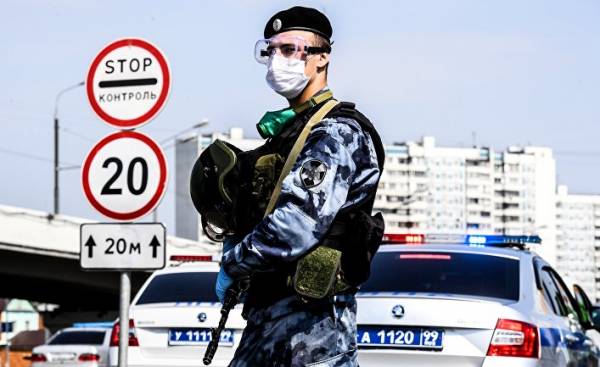 © RIA Novosti, Alexei Filippov | go to photosangelina system for detection of on-road cars without passes
© RIA Novosti, Alexei Filippov | go to photosangelina system for detection of on-road cars without passes
“Every day we hear on TV that made so many preparations. But the people who work at these hospitals, we heard that, in fact, nothing has been done, zero! There is not only masks or disinfectants, but even soap in the toilet. It was in the hospital in the Moscow region”, — says Olga Korobtsova.
Even in the rich Russian capital pandemic coronavirus revealed big problems in the healthcare system. Conservative and influential Russian journalist Maxim Shevchenko has already got over the disease. He spoke about his experiences in his channel on YouTube. The video he shot is still in the hospital. “They can show on TV, Putin holds a video conference as he chastises the governors governors can be green and pale, to report that alleged the hospitals there. If even in Moscow, the hospital in such bad shape, how is the situation with the diagnosis in the regions?”
About this in recent weeks could learn from social networks. Footage from bunk beds, the patients in multi-bed wards. Protective clothing in the Russian regions, almost none.
Health in Russia — a question of money
When 54-year-old Shevchenko had a high fever, he wanted to test for coronavirus. After about two hours of waiting on different hotlines to call him chief physician. “He said, “most Likely you have the flu. Why do you need this test? Still get there””.
In the clinic the doctor prescribed an antibiotic. Temperature Shevchenko became even higher, he suffered for ten days, has repeatedly called for an ambulance. At some point he did the analysis on the coronavirus. The result was negative. As a result of the following four tests. In the end, a friend advised him to undergo CT scan. “And then suddenly ponabezhali the doctors and said, you need a hospital, you have pneumonia”.
Probably it was caused by a coronavirus. In the ambulance he was taken to a hospital on the outskirts of Moscow, where he put in a five-bed ward.
“At half past four in the morning suddenly the light comes, we awaken: everybody out into the corridor! Hurry up, don’t talk. What’s going on? Disinfection. At half past four nights. In the chamber ill. In the corridors all occupied wheelchair, everywhere there are people. We spent an hour and a half of sick people in the hallway.”
Shevchenko wanted only one thing — to get out of there. Friends helped transfer him to a better hospital. Health in Russia — a question of money. For those who have no money who is forced to use free medical care, often have to wait long. Shevchenko criticized the Russian system of health and doubts in the anti-crisis measures of the government:
“If I didn’t go CT, you would now this video. I am sure that statistics in Russia is greatly underestimated. We tell stories. I was sick, and I know a lot of people who are seriously ill, and their tests were also negative. Don’t believe the numbers.”
The pandemic has exacerbated the differences between rich and poor
Shevchenko more than 450 thousand subscribers. His videos have garnered nearly 3.5 million views.
The pandemic clearly highlighted the shortcomings of state and society, said Gerasimov. This applies to corrupt officials, as well as a broken economy. The effects of the virus could further divide society into rich and poor.
In Russia, for example, inflation is already eating away at the savings of the people, says pensioner Olga Korobtsova. “We raised the money, they are on our Bank account. And they became smaller. Because the ruble is strongly reduced. And the prices now will be higher.”
In Georgia, people at risk of poverty. The country has a high share of informal employment. Television journalist Absandze says that his friends in Tbilisi for several weeks out of solidarity continue to pay for the services of cleaners and nannies, who often work illegally. These people can’t turn to the state because of the loss of income. And public support is extremely low.
Therefore, in many countries of Eastern Europe, demands to mitigate the limitations. Irakli Absandze believes this is correct, because the number of infected people remains at a low level. Governments everywhere are under pressure. Because the longer are the restrictive measures in poor countries, the more fear for their future, not only among the poor.
The economic consequences quarantine
In the North Caucasus in Russia already passed the first protests. In Kiev, protesting small and medium businesses. People in cars drove to the city center. The slogan of the action — “Quarantine kills”. Because of the pandemic, States may find themselves in a very difficult situation, said Gerasimov.
“The time when governments will begin to soften the measures likely to be decisive for the question of whether it comes to social unrest or not. For example: in Ukraine a few days ago, it was decided, finally, to reopen the street and agricultural markets. This happened because farmers are faced with great difficulties, could not sell their goods. The government mentioned that the markets can open up, only when they are ready to fulfil all sanitary regulations. But it is not. It is unclear how farmers will react. But it is clear that the tension in society is growing.”
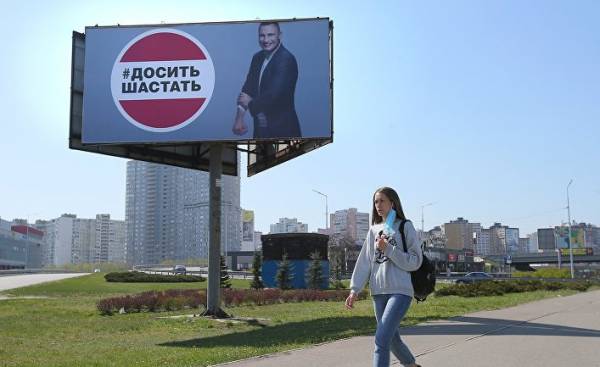 © RIA Novosti, stringer | go to fotomontajes the Billboard, installed in Kiev in connection with the coronavirus. Inscription: “don’t roam”
© RIA Novosti, stringer | go to fotomontajes the Billboard, installed in Kiev in connection with the coronavirus. Inscription: “don’t roam”
In Georgia this year elections will be held. Compared to other Eastern European countries such as Belarus, Georgia — the country democratic. But because of the coronavirus democratization in Georgia could be at risk, says Absandze. The government party and especially its leader, billionaire Bidzina Ivanishvili, former Prime Minister, can take advantage of the situation.
“Bidzina Ivanishvili is one of the richest people in the world and the richest man in Georgia, he can just distribute money and buy votes. This is the worst thing you can do in this country with politics.”
The less trust in government and authorities, the more severe the crisis. Yet Russian President Vladimir Putin has managed to shift responsibility for problems in the country on the other. In the case of the coronavirus he moved it to governors, but it never works. According to a survey by the independent research Institute Levada-Center, Putin’s popularity has dropped below the Governor’s ratings.
Check democratic achievements
Journalist Maxim Shevchenko, although not called for protests in Russia under certain circumstances this can be punished — but calls to draw conclusions.
Coronavirus is a serious challenge for the infected, and for the whole society. People probably will survive this test, but the society as a whole, the state is on the brink. We should be able to determine their own destiny, says Shevchenko.
Increases not only the risk of internal erosion. Pandemic coronavirus affects the war in the Donbass in Ukraine, said Gerasimov. “There were expectations that the severity of the pandemic will stop the feud. But the attacks continue. There is no ceasefire, and is not expected”.
Scheduled for April meeting of heads of States on the issue of the war in Ukraine have been cancelled, including because of the lack of progress in the peace process.
“The fact that the EU and other international partners in the Ukraine now occupied by their own domestic politics and crises in the health system, gives Russia the opportunity to play more aggressively against its neighbours.” People all over the world at a loss. And countries aspiring to democracy, such as Ukraine, is in great danger, they may lose the achievements. In relation to the EU the impression that things are immediate neighbors don’t bother him, complains Gerasimov. In her opinion, the EU should improve the communication strategy with the neighbors to the East.
“There is a fashion contest to see who has the best reputation in assisting these countries. China and Russia have used support in the region for PR campaigns to show that they help these countries, while EU does not. But if you look at the numbers — how much financial aid comes from Russia, and much of the EU then the EU clearly ahead.”
That is, the virus has affected the EU’s relations with its neighbors to the East. Now society in Eastern Europe is changing under the pressure of a pandemic. How much and with what consequences, is not clear.
